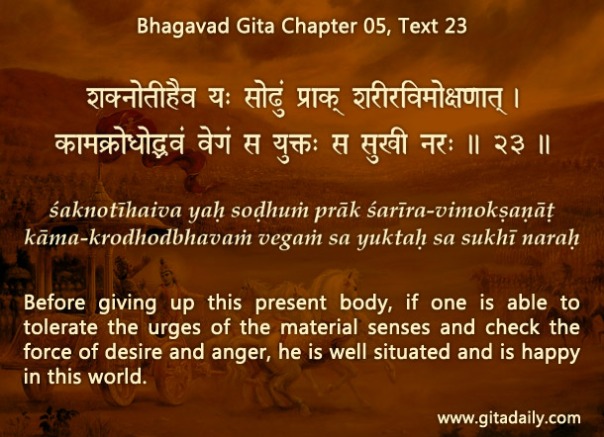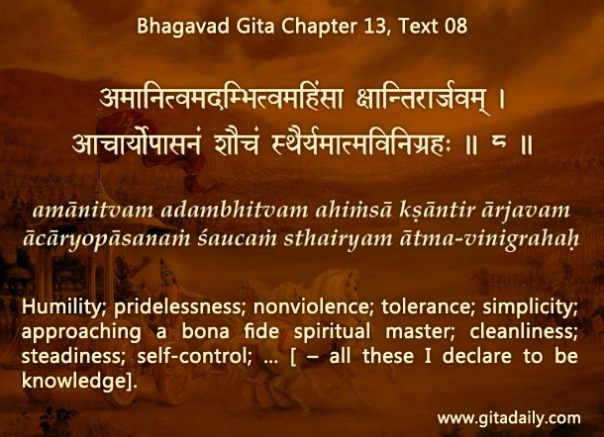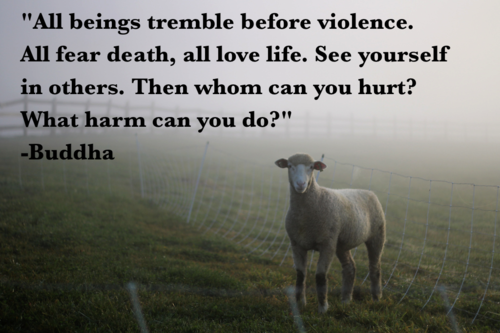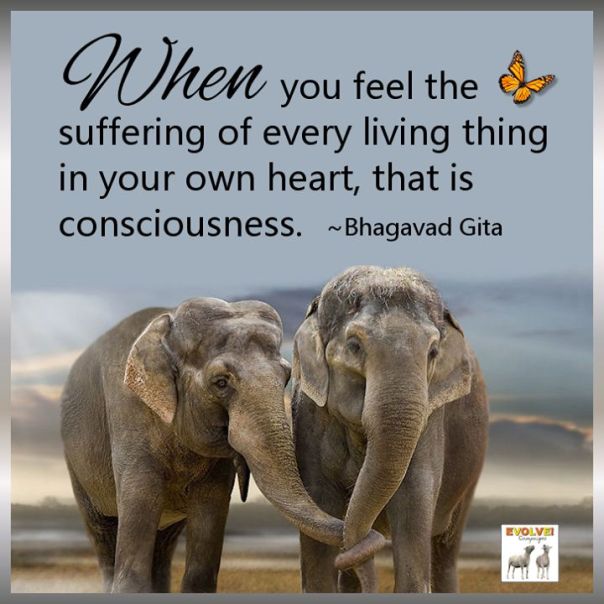Tag Archives: gita
Seeing God in all beings
Source : http://www.thehindu.com/society/faith/seeing-him-in-all-beings/article18619096.ece
Great learning brings great humility, for it exposes the extent of one’s ignorance. That is why Lord Krishna extols the vision of a true bhakta who is endowed with the knowledge of the infinite greatness of the Lord and of His all-pervading presence that inheres in the entire creation, pointed out Sri B. Damodhara Dikshitar in a discourse.
There are as many kinds of devotion as there are individuals. The average devotee is generally compassionate and affectionate to all beings, but feels a sense of differentiation between friends, enemies and so on.
The beginner in the path of devotion worships the Lord in the form of a deity or some form, but fails to accept His presence in other beings. But a true bhakta sees the Lord in all beings and also sees all beings in His Self. This vision is the culmination of jnana and bhakti and a bhakta never slips from this awareness.
It is said that once Saint Eknath, when retuning from Kashi Yatra, was moved to see a donkey almost dying of thirst on the way.
Without any hesitation, he opened a vial of Ganga water and poured it into the parched mouth of the donkey. He saw only the Lord in the soulful eyes and not the donkey.
In the case of Saint Namadev, he once chased a dog that had taken away the bread given to him by his wife, only to offer it the sugar and ghee as well which it had left behind. The dog became the Lord in front of him.
When Lord Shiva is said to have come in the form of a chandala to grace the yagna of Somasi Mara Nayanar, the Adiyar unhesitatingly offered the same hospitality he would offer others.
The Lord wants to show that in the eyes of a true bhakta, where Truth alone is revealed, there is no need for Him to come disguised.
See temptation as an attack, not as a defeat
Source : http://www.gitadaily.com/see-temptation-as-an-attack-not-as-a-defeat-or-even-as-a-precursor-to-defeat/
Suppose soldiers guarding the national border against a hostile neighbour find bullets whizzing past them. Naturally, they will see the bullets as signs of attack and start counter-attacking.
When we start practicing spiritual life, we enter into a war against the forces of illusion, which attack primarily with the bullets of temptation. So, the rising of temptation inside us is an attack. Unfortunately, if we don’t understand the dynamics of the inner war, we see it as a defeat. We think, “I am so fallen as to have this desire. Its presence shows that I can’t follow spiritual standards. Now that the desire has come, let me just give in to it.” By so doing, we become like soldiers who lay down their arms at the sight of the first bullets.
But such capitulation is utterly unnecessary. The Bhagavad-gita (05.23) urges us to anticipate the lifelong presence of desire and anger. Rather than deeming their presence as a spiritual disqualification, it exhorts us to tolerate them by yoga practice.
Just as gallant soldiers determinedly return hostile fire, we can become spiritually gallant when temptation attacks and return fire by striving to intensify our bhakti practice, thus becoming absorbed in Krishna. Such absorption provides higher satisfaction, thereby increasing our resistance to the pleasure with which temptation allures and attacks.
Moreover, bhakti-yoga grants satisfaction not just through absorption but also through connection. That is, we can taste spiritual satisfaction not just at the end of the war when we are fully absorbed in Krishna but also in the thick of the war when we strive to connect with him through remembrance and service.
If temptation spurs us to increase our focus on Krishna, then it becomes not the precursor of defeat, but the prompter to victory.

In the war of egos, the winner is the bigger loser
Source : http://www.gitadaily.com/in-the-war-of-egos-the-winner-is-the-bigger-loser/
When people disagree on an issue, the disagreement sometimes degenerates into a war of egos, where the issues are pushed into the background. People obsess on proving that they are right, not on determining what is right. In such arguments, the winners often end up as bigger losers.
Those who lose such an argument may be seen by the world as losers. But in the long run, those people grow and flourish who are ready to revise their understanding when necessary, who have the humility to learn what is right. The Bhagavad-gita (13.08) indicates that humility is the first of the twenty characteristics of those in knowledge. This implies that humility is the doorway to knowledge – those who have humility learn and grow. Those who prove that they are right even when they aren’t, bang shut the door of humility. They lock themselves outside the house of knowledge, in the arena of illusion.
The notion that one can do no wrong, that one’s view is the right view, that one’s view is, in fact, the only right view – that is essentially the notion that one is God.
So, when discussions start becoming ego issues, best to bow out and thus stay out of illusion.

The Lord’s kindness
Source : http://www.thehindu.com/society/faith/the-lords-kindness/article18572297.ece
In the Bhagavad Gita, Krishna talks of three yogas that lead to moksha — karma, bhakti and jnana. But the Gopikas did not observe any of these paths, and yet were liberated. That is because of their intense love for Lord Krishna. The Lord did not take into account their lack of jnana, but was impressed by their attachment to Him, said M.A. Venkatakrishnan in a discourse. The Lord is kindly disposed towards everyone. But we are so undeserving of His kindness that despite His efforts to reach out to us, we still remain unliberated.
In His abode, the Supreme One is waited on by all those who have attained liberation and yet the Lord is unhappy, because there are many more on this earth who haven’t yet been liberated. So He searches out people to whom He can grant liberation under one pretext or another. If someone utters His name in one of the towns where a temple of His is located, He takes that as worship of Him and looks favourably upon that person. Or if someone accidentally does some good to a devotee, that too begins to count in his favour.
Suppose a devotee is out on the road and there is an unbeliever walking beside him. The unbeliever is armed with a stout stick. Suppose a man who had planned to waylay the devotee is frightened, supposing that the non-believer is there to protect the devotee, then the non believer gets a merit simply by having saved the devotee, albeit unintentionally!
Suppose you rub gold to test its quality and decide to gather the resulting gold dust. It will take you a long time to get some substantial gold from the accumulated dust.
In the same way, the Lord patiently gathers points in our favour to ultimately liberate us, like a man who collects gold dust.
Staunch devotion, the key
Source : http://www.thehindu.com/society/faith/staunch-devotion-the-key/article18475184.ece
Immediately after the revelation of His cosmic form, Krishna explains to Arjuna that only through unswerving devotion to Him can He be known and realised. “He who does work for Me, he who looks upon Me as his goal, he who worships Me free from attachment, who is free from enmity to all creatures, he goes to Me.”
Adi Sankara, in his commentary on the Gita, shows that this statement reflects the essence of the entire Gita teaching, pointed out Sri K. Ramasubramania Sarma in a discourse. It clearly teaches whatever one has to imbibe and practise in life, namely, that one who leads life with his mind fixed on God at all times and remains devoted to Him automatically reaches the goal.
The answer to Arjuna’s doubt regarding the relative merits of jnana and karma is provided here. The two paths are not mutually exclusive and intersect very often and only when being practised one realises this truth. Spiritual knowledge has nothing to do with theoretical or empirical learning or intellectual attainments. It is the direct and intuitive experience or vision of the Absolute Reality. For some it is felt as a moment of illumination in the inner recesses of one’s understanding which soon gets submerged in the rising waves of worldly experiences.
In the case of Arjuna, the vision of the cosmic form of the Lord confers an understanding of the grand design of creation in which all beings subsist in the cycle of birth, growth and death in a somewhat endless manner. But the Lord makes it clear that beholding the vision, which is itself a divine gift, is not attainment of the goal. This vision should help one to gain a permanent experience of the divine truth. Such an awareness that forms the backbone of one’s existence is possible only to one who has staunch devotion to the Lord.
Petition update : Petition demanding punishment sent to Bangalore Police Commissioner IPS N.S. Megharikh
24 Mar 2016 — Dear friends,
These petitions have been forwarded to the concerned authorities. I am thankful to all of you being the voice of the voiceless. Our support for animal rights will hopefully deter such animal rights offenders in the future. People from all around the world have supported this petition and this gives strength to animal rights activists like me to keep pursuing our common dream of a world that can be a happy place for each and every living being.
You all are angels! 🙂




Posted by Ribhu Vashishtha on Wednesday, March 23, 2016